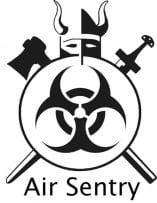Disease Transmission
Aerosols play important roles in the transmission of airborne pathogens between an infected host and a susceptible individual. CDT projects are exploring the links between aerosol microphysics and airborne pathogen survival, the interactions with ambient environmental aerosol and pollution, and new approaches to model aerosol transport and deposition. They are also developing new tools to sample and detect airborne biological aerosol and pathogens.
Investigation of novel methods to study the survival of foot-and-mouth disease virus in aerosols
Our ability to predict and control the spread of disease via aerosols is dependent on understanding how pathogens behave in an aerosolised state. This project will develop and validate innovative approaches to investigate the airborne survival of contemporary strains of foot-and-mouth disease virus. Generation of survival data using novel methods for this economically important livestock pathogen will contribute to understanding how and when airborne transmission events can occur and the role these events play in the epidemiology of the disease.
PhD student: Charlotte Reston
Cohort: 5
Lead supervisor: Prof Jonathan Reid
Institution: University of Bristol
This project is sponsored in partnership with the Pirbright Institute

Transmission of Bacterial Resistance Genes in Aerosols
This project investigates how bacteria carrying genes for antibiotic resistance spread through the air, what factors influence the spread of these bacteria through the aerosol and the potential risks this poses to human health and the environment. This investigation will leverage the innovative CELEBS technology, which enables precise control over aerosol droplet composition and environmental conditions. By employing this technology, we aim to elucidate how variations in salt type and concentration, as well as environmental factors such as relative humidity, impact the transformation of bacterial resistance genes in aerosols.
PhD student: Xia Yi
Cohort: 5
Lead supervisor: Prof. Jonathan Reid and Dr Allen Haddrell
Institution: University of Bristol
The impact of environmental conditions on the prevalence and aerosol transmission of Streptococcus pyogenes
This project is addresses for airborne bacterial infections, focusing on streptococcus pyogenes. This bacteria is most well-known for causing Scarlet Fever but also leads to an estimated 2000 cases of sepsis in otherwise healthy people in England per annum. Outbreaks have tripled between 2015 and 2019 with case fatality reaching 29% among those receiving community care and it is therefore of growing concern.
The project will use state-of-the-art instrumentation, firstly in the TBS in Bristol, then at Imperial College London to explore the influence of environmental factors such as temperature, humidity and air pollution on strain specific survival in air.
PhD student: Phoebe French
Cohort: 5
Lead supervisors: Dr David Green & Prof Shiranee Sriskandan
Institution: Imperial College London
Optimising the performance of air cleaning technology for mitigation of infection in hospital environments
The pandemic has significantly raised awareness of the inadequacy of ventilation in many buildings including healthcare settings where there can be significant infection risks posed by poor ventilation. Air cleaning technologies offer a feasible approach for improving indoor air with increasing evidence that filter based units are effective to mitigate airborne infection risks. However, there is limited data around their role at preventing surface contamination, use for reducing other air pollutants, complex interactions with indoor air flows and smart operation of devices. This collaboration between the University of Leeds and Air Sentry Ltd will explore the design and optimisation of novel approaches to filter-based air cleaning.
PhD student: Anushi Khandare
Cohort: 5
Lead supervisor: Prof Catherine Noakes
Institution: University of Leeds
This project is sponsored in partnership with Air Sentry

Comparing the Airborne Survival of Enveloped and Non-enveloped Viruses Comparing the Airborne Survival of Enveloped and Non-enveloped Viruses
Respiratory aerosol particles transmit pathogens such as SARS-CoV-2 between infected and susceptible individuals. While airborne, the infectivity of viruses declines at a rate that is influenced by the microphysical processes occurring in the aerosol (e.g. water evaporation). This project will compare the airborne survival of enveloped and non-enveloped viruses.
PhD student: Kennedy Peek
Cohort: 4
Lead supervisors: Prof Andrew Davidson & Prof Jonathan Reid
Institution: University of Bristol
Assessing the impact of aerosol degradation on microbial detection in air samples
PhD student: Simon Bate
Cohort: 4
Lead supervisors: Dr Darryl Hill and Dr Richard Thomas
Institution: University of Bristol
Digital Microfluidic Lab-on-a-chip for multiplex detection of biomarkers in exhaled breath
Exhaled aerosols contain precious information on lung health, which could inform diagnosis and therapies and help saving lives. This project will combine emerging microfluidic and lab-on-a-chip technologies to create a portable and fully automated Lab-on-a-chip for detection of multiple disease biomarkers in exhaled aerosols.
PhD student: Daisy Ann Young
Cohort: 4
Lead supervisors: Dr Loic Coudron, Dr Laura Urbano and Dr Ian Johnston
Institution: University of Hertfordshire
Interaction of SARS – CoV2 and Influenza Viruses with Particulate Matter Air Pollution
Higher transmission rates and worsening of health outcome from exposure to SARS-CoV-2 and influenza has been linked to high levels of pollution exposure. This PhD will characterise whether the airborne spread, transmission and infectivity of influenza virus and SARS-CoV-2 increases by hitchhiking on to particulate matter pollution.
PhD student: Erin Kiely
Cohort: 4
Lead supervisor: Prof Alexandra Porter and Prof Kian Fan Chung
Institution: Imperial College London
The structure of exhaled droplets and aerosols
As we know only too well many diseases are transmitted via exhaled droplets/aerosols. Despite their importance we don’t currently have a good understanding of their composition, drying behaviour or structure. This project will develop techniques to characterise these aerosols and, by drying droplets of synthetic respiratory fluid, investigate how the structures are formed.
PhD student: Faizan Ahmad
Cohort: 4
Lead supervisor: Prof. Andrew E. Bayly
Institution: University of Leeds
Modelling of airborne transmissions of respiratory droplets containing COVID-19 virus
COVID-19 virus spreads by the inhalation of “airborne” microscopic respiratory droplets and after evaporation by aerosols of their solid residues. In this project, a first-principle model of the evaporation and subsequent dispersion of the aerosol in air within a room will be developed to provide effective guidelines for safe and social distancing.
PhD student: Benjamin Mignot
Cohort: 3
Lead supervisor: Dr Tariq Mahmud
Institution: University of Leeds
Exhalation, inhalation dynamics of aerosol and airborne transmission disease
Understanding the impact that airborne transport has on pathogens and the influence of environmental conditions on pathogen survival can inform the implementation of strategies to mitigate the spread of diseases such as COVID. However, from the point of generation to exhalation and inhalation dynamic of aerosol is poorly understood.
PhD student: Jianghan Tian
Cohort: 2
Lead supervisor: Prof Jonathan Reid
Institution: University of Bristol
Replication and modelling of infectious respiratory droplets in humans and animals
Using novel aerosol technologies with human and animal samples and pathogens for the first time, the project aims to understand how the changing environment of respiratory droplets influences pathogen viability and transmission. Such understanding through this interdisciplinary approach could aid development of strategies to prevent the spread of respiratory infections.
PhD student: Robert Alexander
Cohort: 2
Supervisor: Dr Darryl Hill
Institution: University of Bristol
Collection methods for early detection of airborne viruses
Airborne aerosols are a primary transport mechanism for many diseases. Through experimentation, computational modelling and engineering prototyping, you will investigate aerosol capture mechanisms for effective real-time monitoring of disease transportation. This will include fundamental studies on the properties of the collected material and the principles of aerosol collection.
PhD student: Stanislaw Koper
Cohort: 2
Lead supervisor: Dr Daniel McCluskey
Institution: University of Hertfordshire

EPSRC CDT in Aerosol Science
University of Bristol
School of Chemistry
Cantock’s Close
Bristol, BS8 1TS
aerosol-science@bristol.ac.uk
Partner Newsletter
Sign up to receive monthly news and updates from the CDT in Aerosol Science, as well as events, training and research webinars.









